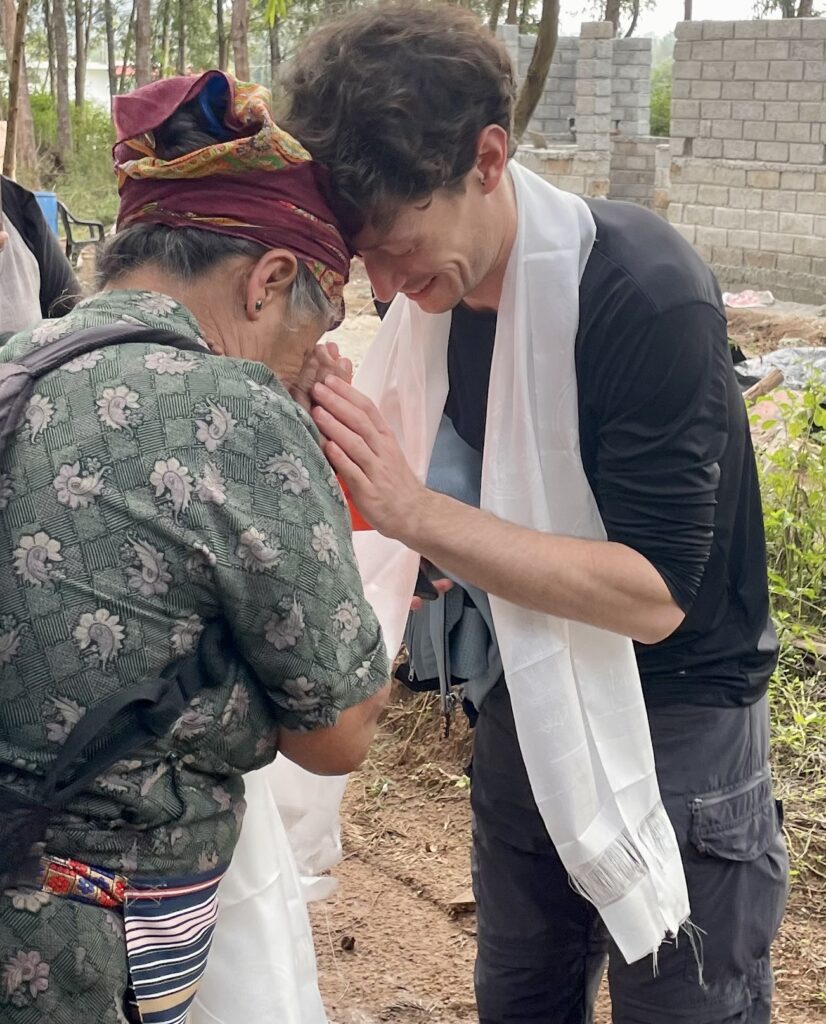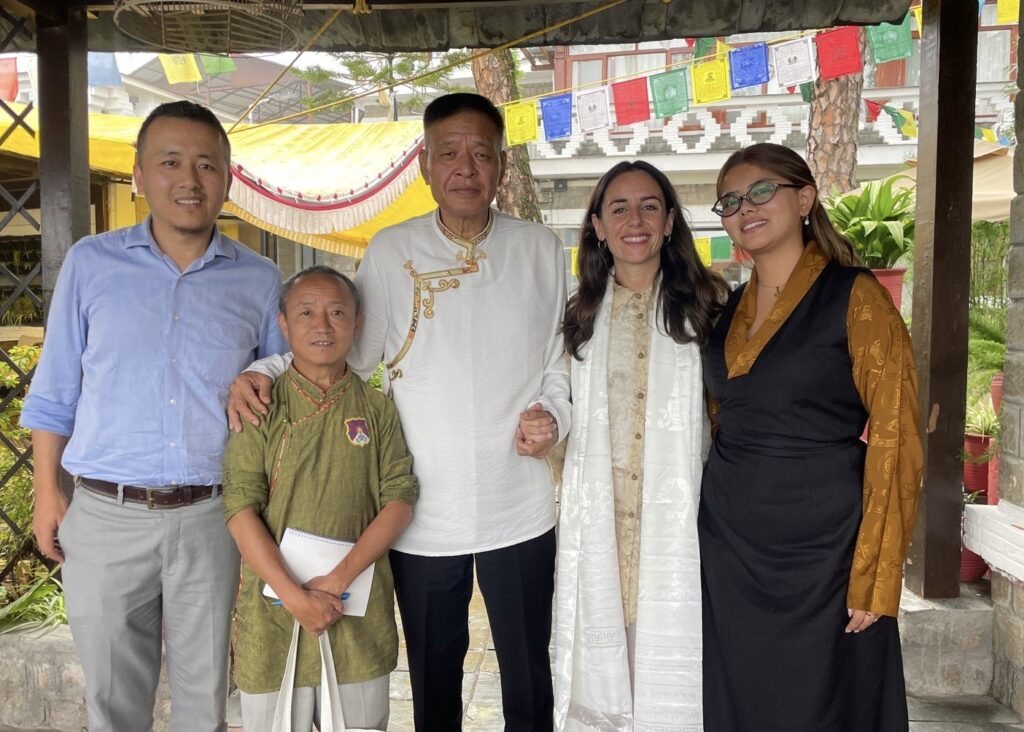Everything that exists is interconnected. This is the reality we witness every day: no living being exists alone, no phenomenon stands apart. To recognize interconnection is to acknowledge that our lives are interwoven with those of others, with communities, with ecosystems. From this awareness comes compassion—the ability to recognize the difficulties of others as our own, because we are part of the same system, and to respond with care.
At Wisedāna Foundation, we see compassion as a universal value that guides both our way of being in the world and our practice of philanthropy. Some cultures have chosen to cultivate this value in a special way, placing it at the center of their vision of life. Tibetan culture is one of these, which is why we support the Tibetan people and the continuity of such a precious heritage.
In supporting the Tibetan community—as in all our intervention areas—our work begins with a deep understanding of the context and the people who live it every day. For us, such knowledge is not just a starting point, but an ongoing and essential practice that shapes every stage of our work.
In this article, we share how—through our method of listening and building relationships—we turn knowledge into concrete and effective action. It is thanks to this approach that we can design interventions that go beyond immediate responses and address the root causes of suffering.
Understanding to create change
At Wisedāna Foundation, care begins with understanding the context in which we want to act. This is not just a starting point, but an ongoing practice of learning. We recognize that reality is impermanent—that is, always evolving—and so we are committed to continually updating our knowledge of it and learning along the way.
For us, knowledge is built primarily through relationships of trust with local partners, who are in direct contact with the communities they support and are often part of those communities themselves. They are our main points of reference in the field: they know the land, its history and its people, and they enable us to recognize meaningful changes in real time. Thanks to our ongoing dialogue with them, we do not impose outside solutions, but co-create interventions that are best suited to the local reality, combining the partners’ contextual knowledge with our philanthropic expertise.
«At Wisedāna, we see contextual knowledge as a strategic function. It is not a preliminary analysis to be filed away, but a continuous process. We nurture it through constant exchange with local partners, who are best equipped to identify challenges, needs and opportunities for growth in the communities they work with. This allows us to adapt interventions quickly when the context changes, avoiding reliance on outdated or partial information.
In-depth contextual knowledge is also essential for evaluating impact. More than quantitative data, we focus on a qualitative analysis of interventions, because many important changes cannot be captured by numbers. A person’s dignity, the quality of an educational relationship, the sense of security within a family—these are real and meaningful transformations that our partners help us recognize, not through charts or statistics, but through ongoing and open dialogue. Without their perspective on the ground, we would risk losing what may be the most important part of our work.»
Investing time, resources, and energy in studying the context and nurturing relationships is, for us, an integral part of philanthropic work. It is both an act of care and a strategic choice, allowing us to address the root causes of problems rather than just their symptoms.

Cultivating knowledge
For us, knowing means observing the context from multiple perspectives and keeping this observation alive over time. We build this knowledge in three ways:
1. MULTILEVEL CONTEXT STUDY
When we start working with a community, we go beyond the surface of the problem. We talk with people on the ground to gather relevant information at different levels—for example, social dynamics, economic conditions and local culture. This helps us identify the root causes of problems, which are often interconnected.
2. DIRECT RELATIONSHIPS WITH LOCAL PARTNERS
Our key points of reference in the field are partners who live close to, or within, the communities we work with. We work to build relationships of trust with them, based on mutual listening, respect, and openness. We recognize that they are the true experts of the context: they know the local reality better than any outside observer, which is why we see their direct experience as a vital resource.
3. CONTINUOUS PRESENCES
Even when we are not physically there, the trust we build with our partners keeps us closely connected to local realities. We devote significant energy to maintaining these relationships, because this is the only way to ensure that our interventions are timely, effective, and truly grounded in the context.
Our work with the Tibetan community
As already mentioned, the Tibetan community embodies a living culture rooted in compassion. This is why we work to protect it and to ensure dignified living conditions for its people in exile. In this complex and constantly evolving context, we apply our philanthropic model—grounded
«In our work with the Tibetan community, we chose to operate on multiple levels, building relationships with different actors on the ground, such as:
- individual members and representatives of local communities;
- social organizations active in the area;
- religious institutions and monasteries, which play an important role in community life;
- the Central Tibetan Administration (CTA), the main governing institution of the Tibetan community in exile.
With all of them we initiated a dialogue to gather information and build as complete an understanding of the context as possible.

In particular, with the CTA we identified three fundamental rights on which to focus our philanthropic efforts: the right to housing, the right to health and the right to education. We then engaged directly with the three relevant CTA departments—the Department of Home, the Department of Health, and the Department of Education. Together with them, we assessed many project proposals and identified those where our contribution could be of greatest benefit, prioritizing initiatives with strong potential for systemic change.
This joint work allows us to design concrete interventions that respond to the real needs of the Tibetan community by addressing the root causes of problems, not just their effects.»
Thanks to this approach, we are able to support the Tibetan community more effectively and with greater awareness, fostering change that grows out of dialogue and the trust built over time.
A sustainable vision
Our goal is not to provide immediate solutions to problems, but to build change that is concrete, lasting, and rooted in the local reality. In this perspective, adopting a long-term vision is an essential part of our approach: only time allows us to deepen our understanding of the context and strengthen relationships with communities and local partners, so that we can truly address the root causes of problems.
By looking beyond short-term consequences, we ensure that our philanthropic work is oriented toward sustainability and the autonomy of beneficiaries, rather than toward dependency. A long-term intervention does not mean a permanent one: the first aims to create lasting change, adapted to the context, while the second simply repeats short-term solutions without ever questioning the complexity of the system and its imbalances.
For change to be real, it cannot depend indefinitely on our presence. On the contrary, we aim for a change that can sustain itself, built on the empowerment of local communities and the creation of virtuous synergies that, at a certain point, make our philanthropic support no longer necessary.
Knowledge as a methodological choice
For Wisedāna Foundation, to know already means to care. Deepening our understanding of the context, listening to those who live it, and building relationships of trust—this is how we create interventions that can address the root causes of problems.
This process of building knowledge does not end at the start of a project but continues over time, sustained by the living relationships we maintain with the places where we work. We choose to take a long-term view: to give ourselves the time to understand, to learn, to build solutions that are rooted in the local context, and to strengthen communities so that change can endure on its own.
This approach takes shape in a multi-stakeholder dialogue aimed at continuous learning. In the case of our support for Tibetan culture, we have engaged in exchange with political institutions, local organizations, religious bodies and community members. Only in this way can we build solutions that are both concrete and sustainable: systemic change begins with knowledge.

Written by Marta Turchetta and Francesco Banfi
Edited by Marta Turchetta
Photo by Fauxels on Pexels



